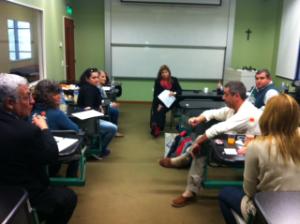As researchers on neural tube disorders, health care providers, and families touched by spina bifida and related defects gathered in Buenos Aires, Argentina, last week, research from the University of Miami took center stage.
Maria Gavier, associate director of programs for the Center for Latin American Studies (CLAS) in the University of Miami College of Arts & Sciences; and Dr. Evadnie Rampersaud, director of the Division of Genetic Epidemiology in the John P. Hussman Institute for Human Genomics, participated in GENErating Changes, the 25th international conference on spina bifida and hydrocephalus.
 |
| A focus group in Argentina. |
Individuals from 30 countries – including more than 60 families affected by spina bifida, who received scholarships to attend – joined the discussion.
There, Gavier and Rampersaud presented research and conducted focus groups on behalf of the Latin American and Caribbean Neural Tube Defects Consortium, a collaborative initiative of CLAS and the Hussman Institute, which “seeks to understand the complex interactions between multiple genes and environmental factors to provide the basis for improving interventions, treatments, and prevention of neural tube defects; as well as help improve the overall lifestyle of people affected by spina bifida and other neural tube defects and their families.”
The study, “Attitudes and Beliefs Regarding Participation in Genomic Research Studies: Insights from Argentines Affected with Neural Tube Defects,” presents findings from March 2012 focus groups and key informant interviews conducted in Buenos Aires to determine attitudes about genomics and genetic medicine. Latin American populations are generally underrepresented in genomic studies, which require a very large and diverse sample of individuals.
The majority of study participants did not have a clear understanding of what genetic research is, but “expressed optimism, hope, and enthusiasm about the possible development of more effective treatments, medicines, or forms of prevention through these types of studies.” However, they noted that “cultural factors and distrust” may prevent people from participating in genetic research.
The report states, “It is extremely important to develop effective strategies that are both culturally appropriate and specifically planned to encourage greater levels of participation.”
The study also assessed participants’ knowledge about factors that lower the risk of neural tube defects, including taking folic acid supplements before and during the first month of pregnancy.
The Consortium was formed to unite medical professionals and civil society organizations to conduct research, exchange information, and educate patients around the genetic and environmental causes of neural tube defects in Latin America and the Caribbean.
“Through this group, we are able to pull together people from different countries and organizations to develop educational programs that are culturally appropriate,” Gavier said, adding that knowledge of genomics and genetic testing is limited throughout Latin America, and particularly outside of major urban areas.
“Buenos Aires is not representative of all of Argentina, so we organized groups with people from other regions in the country, who have less access to services and information,” she said, adding that some families traveled for 20 hours by bus to attend the conference.
Now that they have returned, Gavier and Rampersaud will transcribe the focus groups, analyze the data and add the results to information they learned from previous focus groups in Miami and Buenos Aires.
Gavier said that one of the cultural differences between Miami participants and those in Latin America is the relationship with the family physician. International families have “a more direct connection with their healthcare provider, who generally knows everything about them.”
This shows that any educational programs developed by the Consortium for use in Latin America must involve doctors in a key role.
The Consortium is a key initiative to promote hemispheric collaboration – in an area in which scientific research, citizens’ rights and public policy interact in complex ways. For CLAS, this project is part of its vision to advance a cutting-edge agenda that promotes innovative partnerships, supports research and furthers the common good.
June 24, 2014

